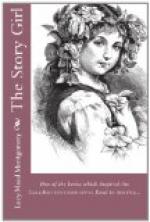We felt then, what we did not understand till later years, that our grown-up relatives did not altogether admire or approve of Uncle Blair. He belonged to a different world from theirs. They had never known him very intimately or understood him. I realize now that Uncle Blair was a bit of a Bohemian—a respectable sort of tramp. Had he been a poor man he might have been a more successful artist. But he had a small fortune of his own and, lacking the spur of necessity, or of disquieting ambition, he remained little more than a clever amateur. Once in a while he painted a picture which showed what he could do; but for the rest, he was satisfied to wander over the world, light-hearted and content. We knew that the Story Girl was thought to resemble him strongly in appearance and temperament, but she had far more fire and intensity and strength of will—her inheritance from King and Ward. She would never be satisfied as a dabbler; whatever her future career should be, into it she would throw all her powers of mind and heart and soul.
But Uncle Blair could do at least one thing surpassingly well. He could write letters. Such letters! By contrast, Felix and I were secretly ashamed of father’s epistles. Father could talk well but, as Felix said, he couldn’t write worth a cent. The letters we had received from him since his arrival in Rio de Janeiro were mere scrawls, telling us to be good boys and not trouble Aunt Janet, incidentally adding that he was well and lonesome. Felix and I were always glad to get his letters, but we never read them aloud to an admiring circle in the orchard.
Uncle Blair was spending the summer in Switzerland; and the letter the Story Girl read to us, among the fair, frail White Ladies of the Walk, where the west wind came now with a sigh, and again with a rush, and then brushed our faces as softly as the down of a thistle, was full of the glamour of mountain-rimmed lakes, and purple chalets, and “snowy summits old in story.” We climbed Mount Blanc, saw the Jungfrau soaring into cloudland, and walked among the gloomy pillars of Bonnivard’s prison. Finally, the Story Girl told us the tale of the Prisoner of Chillon, in words that were Byron’s, but in a voice that was all her own.
“It must be splendid to go to Europe,” sighed Cecily longingly.
“I am going some day,” said the Story Girl airily.
We looked at her with a slightly incredulous awe. To us, in those years, Europe seemed almost as remote and unreachable as the moon. It was hard to believe that one of us should ever go there. But Aunt Julia had gone—and she had been brought up in Carlisle on this very farm. So it was possible that the Story Girl might go too.
“What will you do there?” asked Peter practically.
“I shall learn how to tell stories to all the world,” said the Story Girl dreamily.
It was a lovely, golden-brown evening; the orchard, and the farm-lands beyond, were full of ruby lights and kissing shadows. Over in the east, above the Awkward Man’s house, the Wedding Veil of the Proud Princess floated across the sky, presently turning as rosy as if bedewed with her heart’s blood. We sat there and talked until the first star lighted a white taper over the beech hill.




